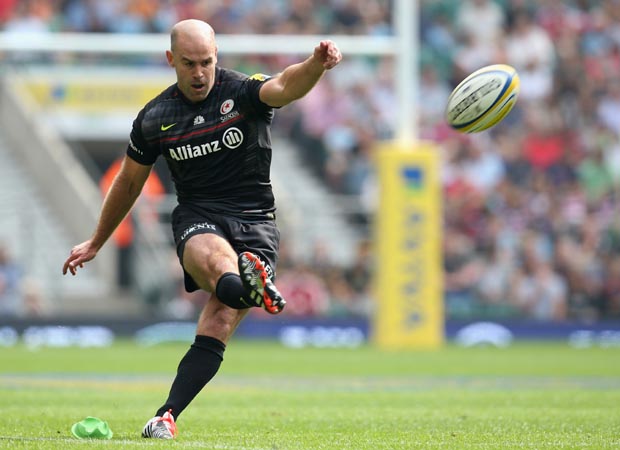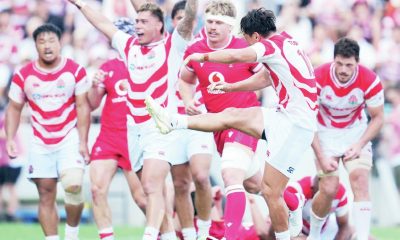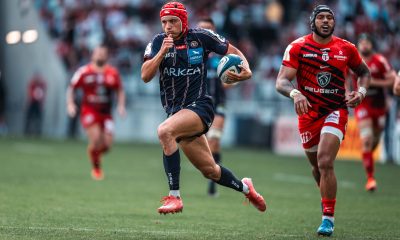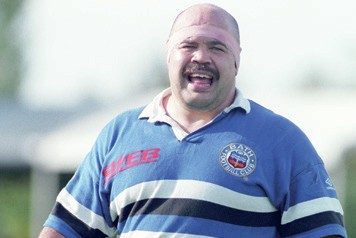
The United States of America are still Olympic rugby champions, as they have been for the 88 years since a hot weekend in Paris in May 1924 at the Stade Colombes. At the end, it took the protection of 250 gendarmes to ensure the Yanks and one Welshman got out of the place in one piece.
A few weeks ago the IRB finally got round to inducting the entire American team into their Hall of Fame, a classic case of better late than never. The Welshman ought to have beaten them to it, not just because he kept law and order on the field as the ‘hysterical’ home fans threatened to run riot but because he was simply the best referee of his day.
Albert Freethy of Neath turned up for that historic Olympic final looking his usual immaculate self – buttoned-up dark blazer with white handkerchief in the breast pocket, cravat and hooped socks.
And to think the Americans had the effrontery to object when informed of Albert’s appointment for the final by Admiral Percy Royds of the RFU.
Whether the Americans smelt a British plot to send them up the creek has never been made clear but they objected just the same. Their team manager, Sam Goodman, was said to have threatened to pull out of the Games in protest before the authorities called his bluff.
Rugby was there thanks to the architect of the modern Games, Baron Pierre de Coubertin, the first, long-term president of the International Olympic Committee.
The Baron liked football but he loved rugby, played for Stade Francais and refereed one of the early French club finals. “Every obstacle was placed in the path of football (rugby),” he once wrote. “Its first fault was to be seen as an English game.
“We were constantly being told that we were anglophiles. This is not the case, because with the exception of a small group of Parisian snobs who only want to wear and display London-washed linen as soon as a pastime comes from the other side of the Channel, it triggers off patriotic reactions in the Press or the public.
“Moreover, the arrival of football was preceded by a reputation for violence. French mothers who feared colds and chilblains were opposed to it. But we have to point to another obstacle.
“It is impossible for the spectator who is not steeped in the game to understand what is happening. He sees a scrum with arms and legs flailing with bodies colliding and fists clenched, physical effort which, if he were a painter or a sculptor would fascinate him but which would horrify the teacher of the sensitive soul.”
There were no sensitive souls on board when the Americans set sail to defend the title they won at the Antwerp Olympiad four years earlier. Faced with finding a largely new team, Goodman roped in eight grid-iron footballers from Stanford University who according to another player, Dudley de Groot, “had never played rugby in their lives”.
The 1924 competition featured only three countries – France, the champions of Europe, Romania and the US, whose raw converts went through a crash-course in the new code during four warm-up matches in England. Guaranteed a bronze at the worst, the Yanks were up for a fight.
According to Norman Cleaveland, a centre who died in 1997, the French “were looking for a punch bag. We were told to go to Paris and take our beatings like gentlemen”.
Full-back Charlie Doe had a different attitude. “If they wanted to push us around,” he said many years later. “Then we damn well pushed them back.”
The Americans found their first fight when French customs refused them entry at Boulogne. Uncle Sam’s finest simply forced their way onto dry land. And when they were refused entry to Colombes for a training session, the players climbed into the stadium.
By the time they returned there for the final against France after thrashing Romania, the Americans were up the wall. So, too, was the majority of a crowd estimated at 35,000 and the early removal of the best French player, the peerless wing Adolphe Jaureguy, brought anti-American feeling to fever pitch. Jaureguy had been bludgeoned into early submission by a few flying hits which Mr Freethy must have considered legal given his fearless reputation for punishing gratuitous violence. The sight of their national hero being carted off infuriated an already hostile French crowd.
The French Olympic Committee had installed wire fencing around the pitch, a smart move – not that it did anything for the image of the sport. Four second half American tries added grave insult to gross Gallic injury. Eye-witnesses told of American supporters being beaten up in the stands, then brought down to the touchline and into waiting ambulances.
“I thought they were dead,” said Cleaveland after Freethy had blown for no-side with the Americans emphatic 17-3 winners. “We were sure it was only a matter of time before they got their hands on us. They went hysterical. They were throwing bottles and rocks and clawing towards us through the fence.”
Doe claimed “there were tens of thousands of people who wanted to rip us to shreds”. Two players, Gideon Nelson and James O’Neill, were attacked before the medal ceremony in an atmosphere which did nothing for The Baron’s concept of the Olympic spirit. An achievement which could have made rugby big States-side passed largely unnoticed at a time which pre-dated mass communication.
“It was no big deal without television,” Doe said more than half a century later. “If we’d had the kind of coverage the Olympics get now, rugby might have become a great American game.”
Instead old Charlie always thanked his lucky stars at getting out of Paris unscathed. “We couldn’t hear the anthem,” he said. “Then we saw the Stars and Stripes being raised and realised they must be playing the Star Spangled Banner.”
And with that they consigned rugby to the Olympic dustbin, the end of de Coubertin’s presidency in 1925 stripping the game of its most formidable champion. The Americans went home and got on with the rest of their lives.
Norman Cleaveland, a mining engineer, became President of the Pacific Tin Corporation before retiring to Santa Fe. Heaven knows, he and the other old boys waited long enough for some IRB recognition.
Doe lived to be 97, Cleaveland to 96, Alan Williams to 91. In March, when Wales were winning the Six Nations, his medal went on display before a club match in Fallbrook – a little reminder that the oldest unbeaten team in Olympic history has not been entirely forgotten.
With rugby back on the curriculum in its truncated seven-a-side form for Rio in four years time, America will get the chance at long last to defend their title.

1 Comment
You must be logged in to post a comment Login
Leave a Reply
Cancel reply
Leave a Reply
You must be logged in to post a comment.

International Rugby
Scotland focused on big picture with Fiji clash key to world ranking

British and Irish Lions
Blair Kinghorn could feature in British and Irish Lions tour despite knee injury

British and Irish Lions
Unconvincing British and Irish Lions labour to patchy victory over ACT Brumbies



























Pingback: great post to read